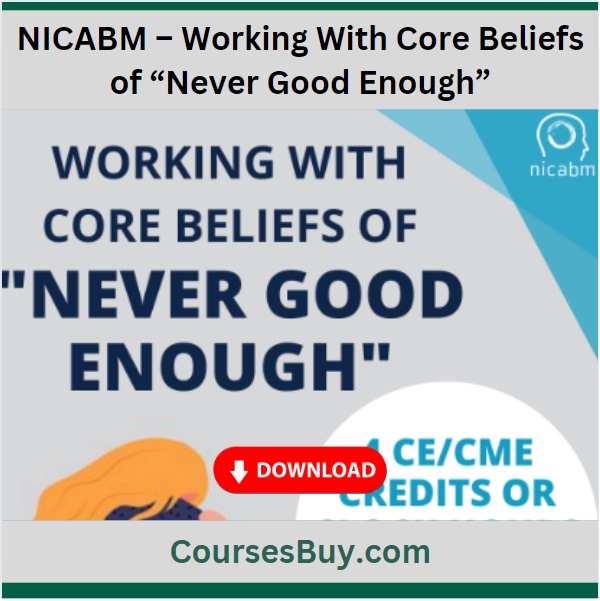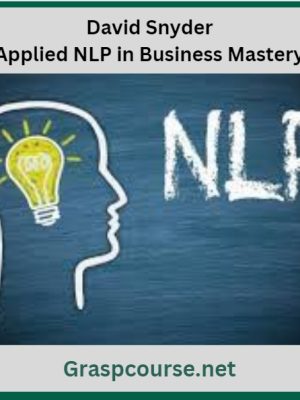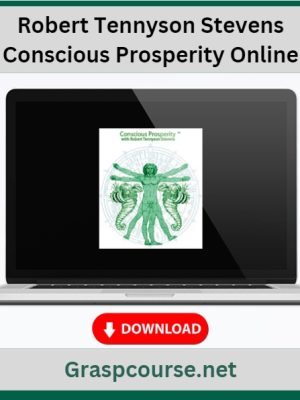NICABM – Working With Core Beliefs of “Never Good Enough”
$197.00 Original price was: $197.00.$92.15Current price is: $92.15.
NICABM Working With Core Beliefs of “Never Good Enough” Course [Download]

1️⃣. What is Working With Core Beliefs of “Never Good Enough”:
NICABM’s course teaches how to help clients overcome feelings of inadequacy. It focuses on addressing deep-rooted beliefs of “never good enough”.
The program offers strategies to tackle psychological factors behind worthlessness feelings, aiming for lasting change.
? PROOF OF COURSE


2️⃣. What you will learn in Working With Core Beliefs of “Never Good Enough”:
In this course, you will gain:
- Understanding of why the ruminating brain magnifies feelings of self-contempt.
- Insights into the biological factors that contribute to feelings of inadequacy.
- Techniques to modify how self-criticism affects physical posture and breathing.
- Strategies to confront the fears linking ‘never good enough’ to depression.
- Tools to reframe self-critical thoughts and internalize positive experiences.
3️⃣. Who is NICABM?

NICABM (National Institute for the Clinical Application of Behavioral Medicine) was established by Dr. Ruth Buczynski, a licensed psychologist with a commitment to integrating behavioral medicine with clinical applications.
Since its inception over 35 years ago, NICABM has become a leader in continuing education for health and mental health practitioners, focusing on the latest research and strategies for improving patient care. NICABM’s mission is to help practitioners achieve better outcomes more quickly through innovative training programs.
4️⃣. Who should take this course?
This course is designed for:
- Healthcare Professionals: Ideal for psychologists, counselors, social workers, and therapists who are committed to improving their therapeutic techniques.
- Educators and Coaches: Those involved in coaching or educational roles will find the strategies applicable for aiding individuals in overcoming personal barriers.
- Students of Psychology and Behavioral Sciences: Students preparing for a career in mental health or therapy will gain invaluable insights and practical tools that are at the forefront of psychological research.
5️⃣. Frequently Asked Questions:
Q1: What are cognitive behavioral techniques?
Cognitive behavioral techniques are practical methods used in therapy to identify and change negative thought patterns that influence emotions and behavior. Examples include journaling, role-playing, relaxation exercises, and mental rehearsals, all aimed at enhancing self-awareness and fostering positive change.
Q2: How can you boost your self-esteem?
Boosting self-esteem involves several key practices:
– Setting realistic goals and celebrating small achievements.
– Practicing positive self-talk and mindfulness.
– Engaging in physical activity which enhances both mental and physical wellness.
– Surrounding yourself with supportive people.
– Learning new skills to increase competence and confidence.
Q3: What are the core principles of cognitive behavioral therapy (CBT)?
The three core principles of CBT focus on:
– Identification: Recognizing distorted thinking and learning the triggers.
– Challenge: Actively questioning and disputing irrational or maladaptive thoughts.
– Replacement: Replacing negative thoughts with more realistic and positive ones to influence behavior positively.
Q4: How do you tackle self-doubt?
To tackle self-doubt:
– Acknowledge and name the doubts to diminish their power.
– Set clear, achievable goals to build confidence.
– Seek feedback and learn from both successes and failures.
– Practice self-compassionate thinking to reduce harsh self-judgment.
Q5: What strategies are effective for dealing with limiting beliefs in therapy?
Effective strategies for dealing with limiting beliefs include:
– Cognitive restructuring to challenge and alter negative beliefs.
– Exposure therapy to confront fears associated with these beliefs.
– Narrative therapy to rewrite the personal stories that reinforce limiting beliefs.
– Acceptance and commitment therapy (ACT) to increase psychological flexibility and develop a more adaptive response to difficult thoughts and feelings.
Q & A
Related products
NLP & Hypnosis
NLP & Hypnosis
NLP & Hypnosis
NLP & Hypnosis
NLP & Hypnosis
NLP & Hypnosis
NLP & Hypnosis












Reviews
There are no reviews yet